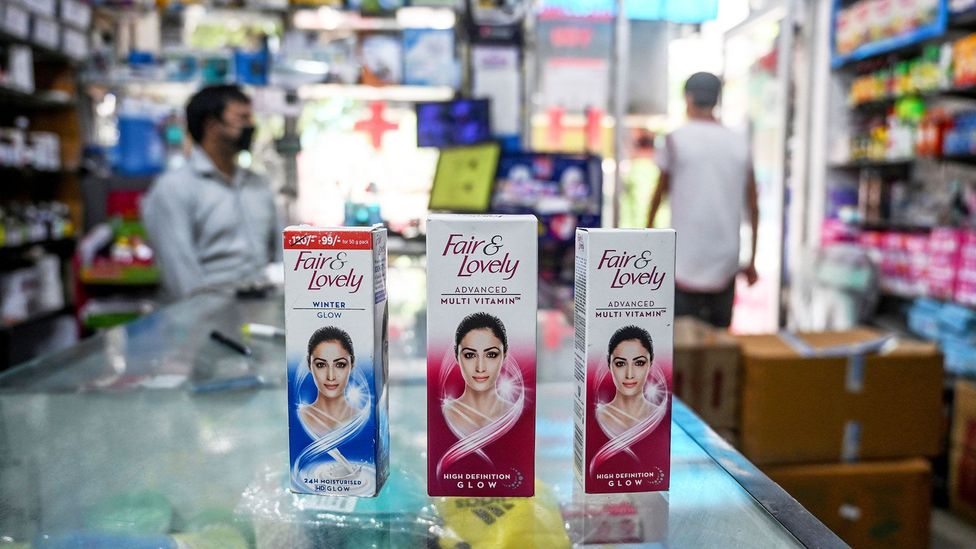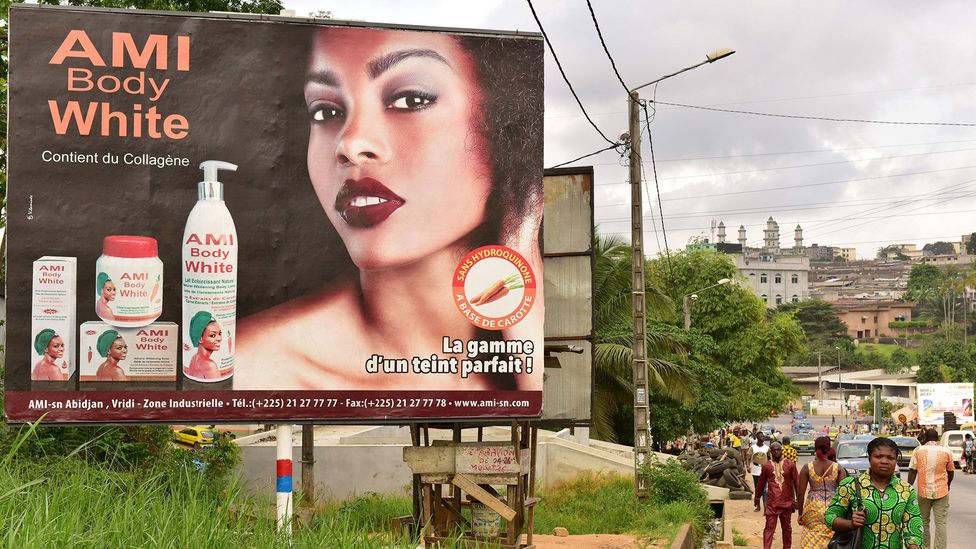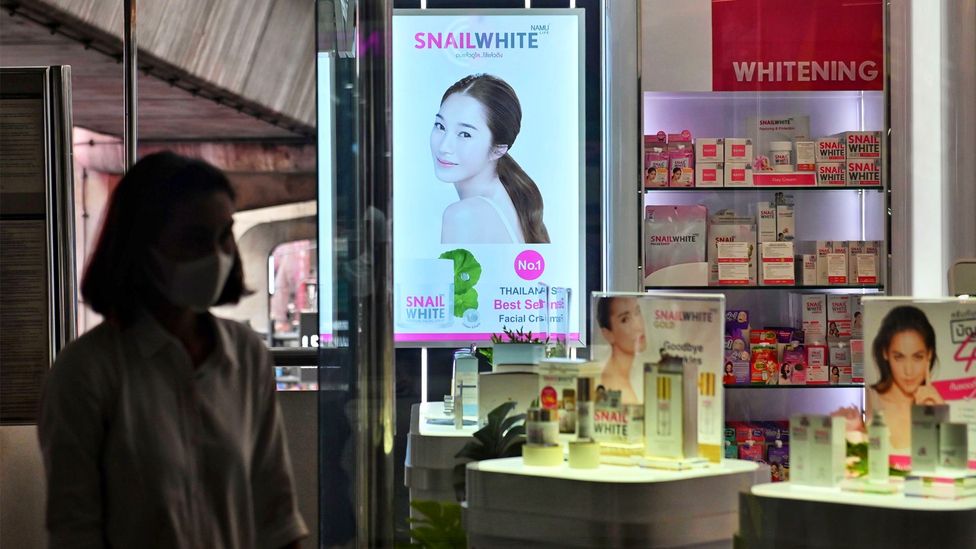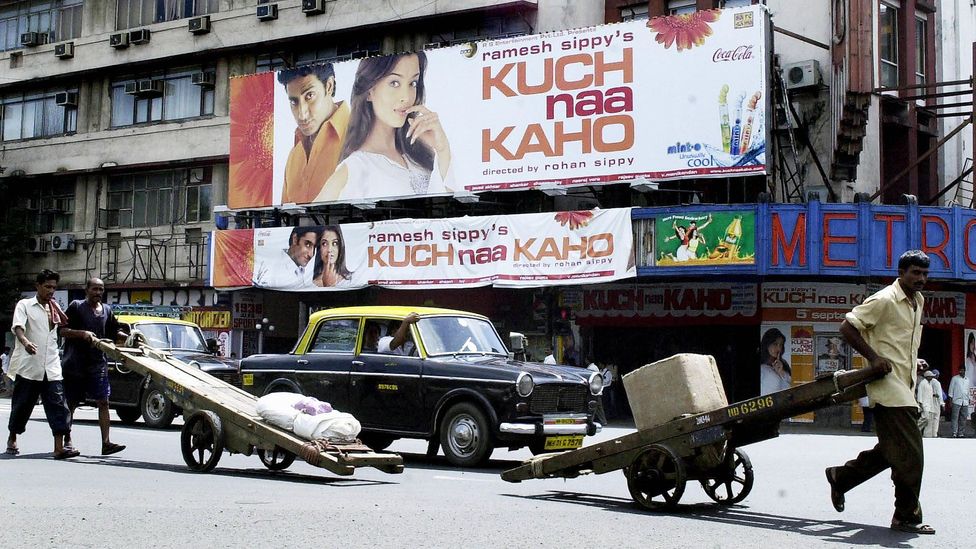How To Turn On Event Skins Kf2
The people fighting 'lite skin' bias
(Image credit:
Getty Images
)

Colourism is a class of bigotry that favours low-cal-skinned members of the same indigenous grouping. Despite its major impact on communities around the globe, it'southward been barely discussed – until at present.
T
The get-go time New Zealand resident Harsharin Kaur visited India, the country of her ancestors, as an adult, she was struck past the corporeality of pressure there was for people to modify the colour of their pare.
Billboards of upcoming movies seemed to prove that simply lite-skinned men and women could make it in the country's motion-picture show industry. Goggle box advertisements for skin care products emphasised that the fairer a woman'southward skin, the more likely she is find a chore, a married man, or happiness.
"There were Garnier and 50'Oreal – companies that I'd never seen promoting those products in New Zealand. But in India, there were all these advertisements about it," says Kaur, who runs the pop Instagram folio The Indian Feminist.
In late June 2020, amid public backlash, L'Oreal announced that they would remove the words "white", "fairness", and "low-cal" from all of their peel products – in particular from their Garnier product line, which has thus far been widely marketed as a range of whitening products in South Asian countries.
All this in a country whose population is far more likely to be dark-skinned – a necessary protection against the harsh UV rays from the Dominicus that come with living closer to the equator.
You lot might as well like:
- Why race matters when it comes to mental health
- Is 'face up-ism' spoiling your life?
- How overcoming racism is necessary for humanity's survival
The grade of discrimination that favours lite-skinned members of the same ethnic group is known as colourism. A widely discussed phenomenon in blackness communities, colourism has been, until recently, barely spoken of in South Asian circles, despite the amount of trauma and even death it has left in its wake.

Colourism remains a phenomenon in black communities, every bit evidenced past this advert for skin-whitening products in the Republic of cote d'ivoire (Credit: Getty Images)
Only the May 2020 killing of George Floyd that sparked worldwide protests and conversations surrounding anti-racism has brought about a social awakening for people in South Asian countries and their diasporas.
A new Netflix reality series called Indian Matchmaking also has sparked meaning debate after its protagonist, a globe-trotting Indian adult female who hunts downwardly potential spouses for her clients, put lighter-skinned women and men on a pedestal, championing their complexion every bit an obviously desirable aspect.
In the wake of these protests and connected highlighting of discriminatory ethics in popular culture, more than and more than people have begun to denounce colourist ethics and the products that espouse them.
Some companies take responded. Unilever, the parent company of the pop peel care brand Fair & Lovely, also announced that all peel care products nether its umbrella would accept the words "fairness", "whitening", and "lightening" removed, and the Off-white & Lovely brand would be renamed Glow & Lovely.

Unilever recently appear that their Fair & Lovely make would exist renamed Glow & Lovely (Credit: Getty Images)
A spokesperson for the company says these changes to the make were already underway, only have been accelerated in light of recent events – such as the launch of a widespread petition calling for the visitor to pull Fair & Lovely from shelves birthday, and people on social media denouncing Unilever CEO Alan Jope for criticising systemic racism while continuing to market and sell the incredibly profitable £256m-a-twelvemonth line.
And while irresolute the name to Glow & Lovely has garnered the company some praise, experts say it's non enough. It is – after all – still on the shelves.
"I don't know if it'southward any different. I commend them considering information technology was probably one of the nearly recognisable brands. Just I'm disheartened to hear that it'southward 'Glow & Lovely' because glow really is only another manner of maxim 'lightening'," says Nikki Khanna, a professor of sociology at the University of Vermont who has been studying race relations and colourism for more than 20 years.
"The word 'glow' itself – the paradigm it is conjuring and the advertisements they produced through the years are [of women who have] this glowing white epitome. My hope is that we see a repackaging again – and when I say 'repackaging', what I mean is a complete elimination of this product."
Colourism consequences
While much more research needs to be washed, several studies accept pointed out the harm caused past colourism.
One consequence is the issue on mental health. One study, for example, institute a correlation between symptoms of depression and prejudices against darker skin tones among Asian-American women.

Some research has found that colourism impacts mental health (Credit: Getty Images)
"Historically, a lot of communities accept held 'black' as a bad thing and in that location are lots of connotations of [people who accept darker skin tones] being 'dirty' or 'less educated' that people have culturally transmitted across time, inside and exterior of their groups," says Alisia (Giac-Thao) Tran, one of the study'due south authors and associate professor of counselling psychology at Arizona Country University.
"Within the South Asian customs, this has a long history with ties to the caste system and social hierarchies."
One of the nigh prominent manifestations of older generations imposing colourist ideals occurs in the realm of matrimony – equally seen in Indian Matchmaking. In Due south Asian communities, it is common practise for parents to arrange the marriages of their adult children by coming together prospective spouses and their families. Historically, the immature couple can simply spend their lives together if the elders approve of the lucifer, although in recent years more and more than young people are choosing to go the "dear spousal relationship" route through which they select their own partners, sometimes at risk of estrangement from their families.
Ane study on Indian arranged marriages plant that darker-skinned marriage candidates were rated lower in preference by prospective mothers-in-police force, compared with their light-skinned counterparts.
These findings are not surprising. Preferences for light-skinned brides have been prevalent in arranged marriage newspaper advertisements for decades; light-complexioned women often are highlighted in these ads as a manner to attract more than prospective grooms.
Prominent Indian marriage websites like shaadi.com carried these practises into the internet.

The Indian spousal relationship website shaadi.com recently removed the terminal vestiges of its skin-colour filter (Credit: Alamy)
The matrimonial website originally asked its patrons to indicate the colour of their pare using a scale of descriptors that ranged from "off-white" and "wheatish" to "dusky" (pregnant night), and then allowed users to select their preferences in a potential life partner using skin tone as one of the filters.
"Newspaper ads used skin color as one of the filtering mechanisms and we replicated that. Companies evolve, just like people do, and 4 or 5 years agone, we decided to step away from using skin filters in the matchmaking procedure," says Adhish Zaveri, managing director of marketing for shaadi.com.
But a remnant of this skin tone filter remained on the website: the user interface for selecting a pare tone remained, even though whatever requested skin tone specifications were ignored in the actual search results.
When news of information technology reached a Facebook grouping of South Asian women living in Due north America, a petition was immediately launched to bring information technology to the attending of shaadi.com.
"Inside 24 hours, we had i,500 signatures," says Hetal Lakhani, a Dallas, Texas resident who created the petition. "Shaadi.com decided to go rid of the filter."
Cultural shift
While colourism in Due south Asian communities has been largely overlooked until the by decade, social media and the net are changing that.
A biracial Indian-American woman, Khanna's about recent volume Whiter: Asian American Women on Skin Color and Colorism is a compilation of personal essays on the impacts of colourism written by women from diverse Southward Asian backgrounds living in the United States.
Her feel in researching the book, she says, is a good example of how today'southward digital mural is changing the discussion around topics like colourism.

Bollywood stars oft have lighter skin tones (Credit: Getty Images)
Khanna began this project in 2017 with a telephone call for submissions on Facebook. "Social media was really advantageous to aid me go the word out to women mode beyond my own social networks," she says.
Khanna says she was initially surprised by the number of people who had no idea that colourism was an result among Asians and diaspora communities.
But over fourth dimension, that's shifted – in large part thanks to social media campaigns like Dark is Beautiful and #brownisbeautiful. Such campaigns accept started to create a space for dark skinned Due south Asians to talk about their shared experiences, break the silence and alter the discourse on colourism in their communities.
Tran agrees that social media tin play a key role in dismantling these centuries-former beliefs – in detail by giving individuals more than admission to agreeing allies who question colourist views. Many of these people tend to vest to younger generations that are starting to realise the generational gap in the discourse surrounding racism and colourism. Instead of internalising these values, they are seeking to turn down them.
"These small conversations, these small interactions: they're a big piece – and they amass to eventually helping us overcome generational prejudices that permeate our societies," says Tran.
--
Bring together one one thousand thousand Future fans by liking u.s.a. on Facebook , or follow us on Twitter or Instagram .
If you liked this story, sign upward for the weekly bbc.com features newsletter , chosen "The Essential List". A handpicked pick of stories from BBC Future, Culture, Worklife, and Travel, delivered to your inbox every Friday.
How To Turn On Event Skins Kf2,
Source: https://www.bbc.com/future/article/20200818-colourism-in-india-the-people-fighting-light-skin-bias
Posted by: sweetoneved.blogspot.com


0 Response to "How To Turn On Event Skins Kf2"
Post a Comment